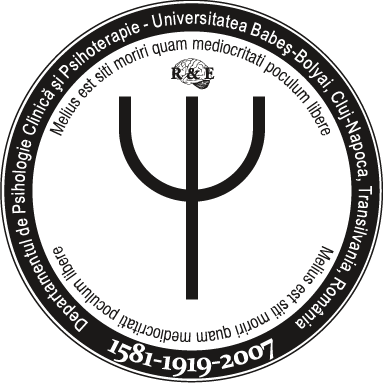(R) GAD CLINICAL TRIAL – A BRIEF DESCRIPTION
TO START: FALL 2008
I. TITLE
· Cognitive Therapy vs. Rational Emotive Behavior Therapy vs. Acceptance & Commitment Therapy in the Treatment of Generalized Anxiety Disorder. A Randomized Clinical Trial: Outcomes, Theory of Change, and Cost-Effectiveness.
II. LOCATION
· The International Institute for the Advanced Studies of Psychotherapy and Applied Mental Health at Babes-Bolyai University, Cluj-Napoca, Romania (see for details and for the expertise of the Institute in running large scale randomized clinical trials: www.psychotherapy.ro). The trial is funded internationally.
III. OBJECTIVES
· To investigate, in a randomized clinical trial, the efficacy, the mechanisms of change, and the cost-effectiveness of Cognitive Therapy (reference treatment) vs. Rational Emotive Behavior Therapy vs. Acceptance & Commitment Therapy in the treatment of generalized anxiety disorder (GAD).
o Theoretical implications: (1) a better understanding of the mechanisms involved in GAD and (2) a better integration of the diverse cognitive pathogenetic mechanisms of GAD into (a) a coherent cognitive-behavior theory and (b) a rigorous and integrative psychological assessment strategy (measures/scales).
o Practical Implications: New clinical protocols and guidelines for the evidence-based assessment and therapy of GAD.
IV. INTERNATIONAL COORDINATING TEAM
· Principal Investigator (PI): Dr. Daniel David, Professor, Ph.D., Babes-Bolyai University, Romania, Director of the International Institute for the Advanced Studies of Psychotherapy and Applied Mental Health (see his expertise at: www.psychotherapy.ro) & Co-PI: Dr. Aurora Szentagotai, Associate Professor, Ph.D., Babes-Bolyai University.
· External Research Consultant: Dr. Douglas Mennin, Ph.D., Associate Professor, Yale University, USA, Director of Yale Anxiety & Mood Services at Yale University.
· Psychiatric Components Consultants: Dr. Doina Cosman, MD, Professor, Ph.D., and Dr. Viorel Lupu, MD, Professor, Ph.D., “Iuliu Haţieganu” University of Medicine and Pharmacy, Romania.
1. Cognitive Therapy (CT) Coordinating Group
· Coordinator: Ramona Moldovan, Assistant Professor, MA, Babes-Bolyai University, Clinical Psychologist (trained in CT by the Romanian Association of Cognitive and Behavioral Psychotherapies with international CT supervisors).
· Clinical Consultant: Dr. Robert Leahy, Clinical Professor, Ph.D., Department of Psychiatry, Weill-Cornell University Medical College, USA (President of the Academy of Cognitive Therapy (ACT); President of the Association for Behavioral and Cognitive Therapies (ABCT)).
· Research Consultant: Dr. Stefan G. Hoffman, Professor, Ph.D., Boston University, USA, Director of the Psychotherapy and Emotion Research Laboratory at Boston University.
2. Rational Emotive Behavior Therapy (REBT) Coordinating Group
· Coordinator: Bianca Macavei, Assistant Professor, MA, Babes-Bolyai University, Clinical Psychologist (trained in REBT by the Romanian Association of Cognitive and Behavioral Psychotherapies with international REBT supervisors; supervisor in REBT at the Albert Ellis Institute, USA).
· Clinical Consultant: Dr. Windy Dryden, Professor, Ph.D., University of London, UK, Supervisor in REBT at the Albert Ellis Institute.
· Research Consultant: Dr. Raymond DiGiuseppe, Professor, Ph.D., St. John University, USA, Director of Professional Education at the Albert Ellis Institute (Past President of the ABCT).
3. Acceptance & Commitment Therapy (ACT) Coordinating Group
· Coordinator: Ioana Cristea, Assistant Professor, MA, Babes-Bolyai University, Clinical Psychologist (trained in ACT by the Romanian Association of Cognitive and Behavioral Psychotherapies with international ACT supervisors).
· Clinical Consultant: Dr. Kelly G. Wilson, Associate Professor, Ph.D., University of Mississippi, USA, ACT Supervisor.
· Research Consultant: Dr. Steven Hayes, Professor, Ph.D., University of Nevada, USA; Founder of ACT (Past president of ABCT).
V. DESIGN
A rigorous randomized clinical trial, following the model implemented in one of our previous studies on major depressive disorder (MDD) (see the below cited study), will be designed for this study.
· David, D., Szentagotai, A., Lupu, V., & Cosman, D. (2008). Rational emotive behavior therapy, Cognitive therapy and Medication in the treatment of major depressive disorder: A randomized clinical trial, post-treatment outcomes, and six month follow-up. Journal of Clinical Psychology, 64, 728-746.
All the methodological components (e.g., treatment integrity, allegiance effect, missing data analysis, attrition/power calculation etc.) of this trial on GAD will be implemented similar to the ones in the MDD trial (mentioned above). Each treatment will consist of about 20 sessions, delivered over a 14-week period.
1. Outcome measures
a. General:
· OQR 45.2 – (Adult outcome measure; age 18+)
· POMS (Profile of Mood States; includes: (a) functional and dysfunctional negative feelings scores and (b) positive affect)
· SF-37 (Quality of Life)
b. Specific:
· HRSA (Hamilton Rating Scale for Anxiety)
· BAI (Beck Anxiety Inventory)
· GAD-Q-IV (the Generalized Anxiety Disorders Questionnaire 4th Edition)
SCID-RV will be used for categorical diagnoses (based on DSM-IV)
Note: All outcome measures will be administered pre- mid- and post-treatment. The BAI will be administered each session.
2. Hypothesized mediating (i.e., mechanisms of change) variables
· ATQ (Automatic Thoughts Questionnaire) (related to CT)
· DAS (Dysfunctional Attitudes Scale) (related to CT)
· ABS-II (Attitudes and Beliefs Scale – II) (related to REBT)
· USA (Unconditional Self-Acceptance) (related to REBT)
· AAQ (Acceptance and Action Questionnaire) (related to ACT)
· EAS (Experiential Avoidance Scale) (related to ACT)
· RE (Response Expectancies for Non-volitional Outcomes [i.e., anxiety, relaxation]; VAS type scales) (not specifically related to any of the investigated forms of therapy)
· PSWQ (Penn State Worry Questionnaire) (not specifically related to any of the forms of therapy)
· DERS (Difficulties in Emotional Regulation Scale) (not specifically related to any of the investigated forms of therapy)
· AIM (Affect Intensity Measure) (not specifically related to any of the investigated forms of therapy)
Note: All mediating variable measures will be administered pre-, mid-, and post-treatment. The ATQ and RE will be administered each session.
3. Hypothesized moderator variables
· LOT (Level of Optimism and Pessimism)
· Brief-Cope (Coping Mechanisms)
Note: All hypothesized moderating variables measures will be administered pre-, mid-, and post-treatment.
Other measures will include demographics and relevant medical data. Some cognitive tasks (e.g., cognitive inhibition/interference) and psychophysiological measures will be also employed (to be established) to complement the self-report measures.
